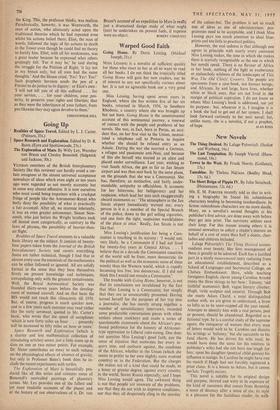Warped Good Faith
Going Home. By Doris Lessing. (Michael Joseph, 21s.) Miss LESSING is a novelist of sufficient quality for those who react to her at all to want. to read all her books. I do not think the ironically titled Going Home will gain her new readers, nor be of interest to any not specifically curious about her. It is not an agreeable book nor a very good one.
Miss Lessing, having spent seven years in England, where she has written five of her six books, returned in March, 1956, to Southern Rhodesia, a country where she was brought up but not born. Going Home is the unsentimental account of this sentimental journey, a renewal of contact with the people and problems of her novels. She was, in fact, born in Persia, an acci- dent that, on her first visit to the Union, necessi- tated a telephone call to Pretoria to inquire whether she should be refused entry as an Asiatic. During the war she married a German, a refugee and passionate anti-Nazi, and because of this she herself was treated as an alien and placed under surveillance. Last year, wishing to visit South Africa, she got as far as Jan Smuts airport and was then sent back by the same plane, on the grounds that she was a Communi0. She has, therefore, an instinctive, and fairly under- standable, antipathy to officialdom. It accounts for her bitterness, her belligerency and her suspicion, which lead her into such exaggeratedly absurd statements as : 'The atmosphere in the Jan Smuts airport immediately warned me; every person in it is a member of the Special Branch of the police, down to the girl selling cigarettes, and one feels the tight, suspicious watchfulness of the place at once.' Really, Jan Smuts is not like that.
Miss Lessing's justification for being a Com- munist is touching in its naivety : 'I would not, very likely, be a Communist if I had not lived for twenty-five years in Central Africa. . . . I believe that in a decade the Communist countries of the world will be freer, more democratic (in the political as well as the economic sense of these words) than the Western world, which is rapidly becoming less free, less democratic. If I did not think this I would not remain a Communist.'
The trouble with Going Home, however, is not that its conclusions are invalidated by the fact that Miss Lessing is a Communist, but simply that they are so amateurishly presented. Having turned herself for the purposes of her trip into a journalist, she has merely strung together a number of unsatisfactory interviews, recorded some predictable conversation pieces with white settlers about cookboys and made a series of questionable statements about the African's pro- fessed preference for the honesty of Afrikaner- type oppression to Liberal cake-eating. One does not question Miss Lessing's good faith, nor the sense of injustice that motivates her every in- quiry into, and outburst against, the condition of the African, whether in the Union (which she seems to prefer to her own slightly more evolved country) or in the Federation. But the charges she makes are of a kind that could be made, to a lesser or greater degree, against every country in the world, Soviet Russia especially, and I hope Miss Lessing would agree. The awkward thing is not that people are unaware of the problems, nor that they do not wish to improve conditions, nor that they all desperately cling to the sanctity of the colour-bar. The problem is not so much one of ideas as one of administration; pro- grammes need to be acceptable, and I think Miss Lessing pays too much attention to ideal blue- prints and too little to practical politics.
However, the real sadness is that although one agrees in principle with nearly every comment Miss Lessing makes, the tone in which she makes them is scarcely recognisable as the one in which her novels speak. There is no flavour of Africa in her book, nothing of the light or exuberance or melancholy wildness of the landscapes of This Was The Old Chiefs' Country. The people are specimens from a case-book, not human beings; and Africans, by and large, have lives, whether white or black ones, that are not lived in the margin of political aspiration. I do not know to whom Miss Lessing's book is addressed, nor yet its purpose : but, whatever it is, I imagine it is a book she had to get out of her system. 1 shall look forward curiously to her next novel; for, unlike many, she is a novelist, if not a prophet,










































 Previous page
Previous page